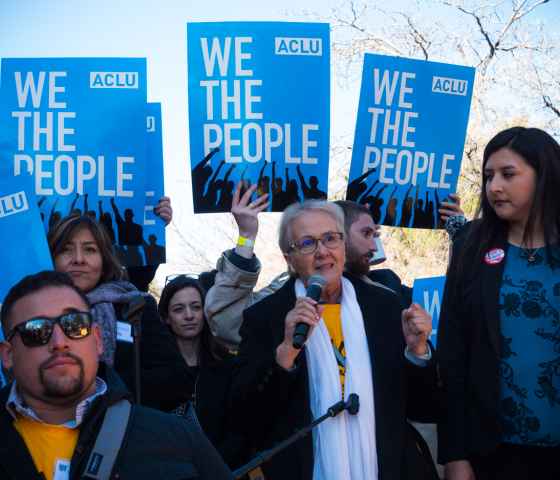I am sitting in the basement of a church in rural New Mexico, fifty miles from the US-Mexico border. The woman across from me is wiping her tears with a handkerchief. Her two young sons sit next to her, staring at the floor.
“I don’t know if I will ever see him again and I don’t know if I can pick up and move our kids to a country I know nothing about and would be afraid of living in,” she says. “You know, I did not ask him for his papers before I fell in love with him.”
Her husband, who has never been in trouble with the law and has lived in the U.S. since he was a child, was deported after a local police officer reported him to border patrol. The officer had pulled them over for a cracked windshield.
Americans need a reality check on the “border security first” rhetoric that stands in the way of any real progress on immigration reform. The reality of many U.S.-Mexico border communities is not what politicians are telling us.
The U.S.-Mexico border region has been my home for almost 20 years. My family and I have personally witnessed the buildup of federal border enforcement resources, leading to a dramatic increase in racial profiling, traumatic family separations and civil rights violations.
In the last decade, the number of Border Patrol agents monitoring the US-Mexico border has doubled to almost 10 agents per mile. If they distributed themselves equally, the agents could literally see each other across the desert plains of the border lands. And this number ignores all the other federal agents--ICE, FBI, DEA, ATF, the National Guard, and thousands of police and sheriff’s deputies—who occupy the area.
Nor does it include the near 700 miles of border fencing, the helicopters, the airplanes, the boats, the unmanned aerial vehicles (“drones”), the cameras and sensors, the blimps, and the all-terrain vehicles deployed at the border. Where once Border Patrol agents rarely appeared, now their presence is inescapable.
More problematically, these agents aren’t constrained to operations along the border line. Instead, they are dispersed northward and into the most populated areas of the state, stopping and harassing people, especially those of Hispanic descent who are just traveling to their places of work. Many of these residents are not only U.S. citizens, but their families have lived in this region for generations.
Border residents regularly pass through Border Patrol checkpoints, where agents not only demand proof of citizenship but also press them to explain “where are you going” and “where are you coming from?” Cameras and backscatter devices scan their vehicles and canine search teams circle their cars. The border is now a “Constitution-lite” zone. It is a place where we seem to have no protections from police searches and no right to expect privacy. Exercising the right to remain silent invokes suspicion and is treated as an obstruction of justice.
Next to the woman and her sons sits a young man who describes his plans to move to “some small town” in Mexico in order to be with his recently deported wife. He is a U.S. citizen and speaks no Spanish.
Another young woman, also a U.S. citizen, shares that she has two younger brothers and a younger sister. Both of her parents were recently deported as a result of a community raid. Barely 18, she is solely responsible for taking care of her siblings.
All three of these American families are now struggling to make ends meet. But so many Americans, despite our own immigrant roots and core values of fairness, would write these tragedies off with “What part of illegal don’t you understand?”
Americans who live in border communities are predominantly families of mixed statuses, many of us are U.S. citizens, but many are long-time legal permanent residents and many are family members who are trying, sometimes desperately, to get “documents” in the face of an incredibly broken and dysfunctional immigration system. Most importantly, we are families. We are part of an intercultural community, proud of our Spanglish and indigenous roots. We are businesses, schools and churches. We believe in the promise of the United States: economic security, individual liberties and equal opportunity.
The rhetoric of “border security first” feeds into a system that not only generates suffering for border communities, but defies logic. We’ve seen that no amount of border enforcement can staunch the flow of immigration, and it does nothing to prevent individuals from overstaying tourist visas.
But there is a way out of this insanity. We would have to be creative, persistent and smart. We would start by admitting that a law-enforcement only model is folly. We will have to look at our immigration system and truly reform it in a just and fair manner that preserves family unity and better addresses the labor demands of the country without exploiting workers in the U.S. or abroad.
We will have to look at our trade policy and see how this has contributed to the problem. And we will have to be more creative about our drug policy and acknowledge that our 40-year drug war has only made the problem worse for us and for our neighboring countries.
I know this is a tall order, but Americans have faced larger challenges. At the very least, we should ensure that whatever law enforcement systems we have in place include proper accountability and oversight; reinforcing the human and civil rights of border communities.
Vicki Gaubeca is the director for the ACLU of New Mexico Regional Center for Border Rights in Las Cruces, NM.

